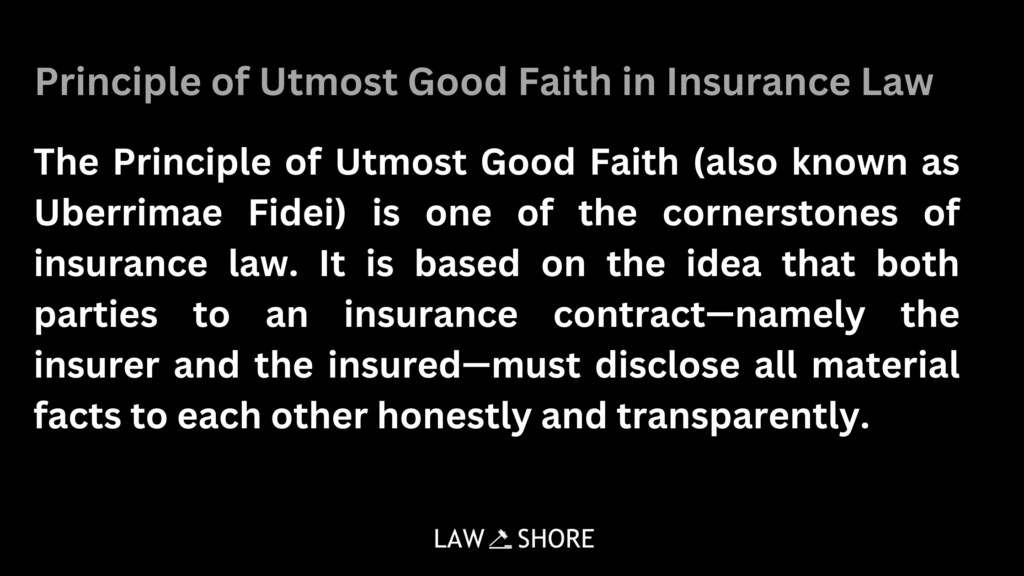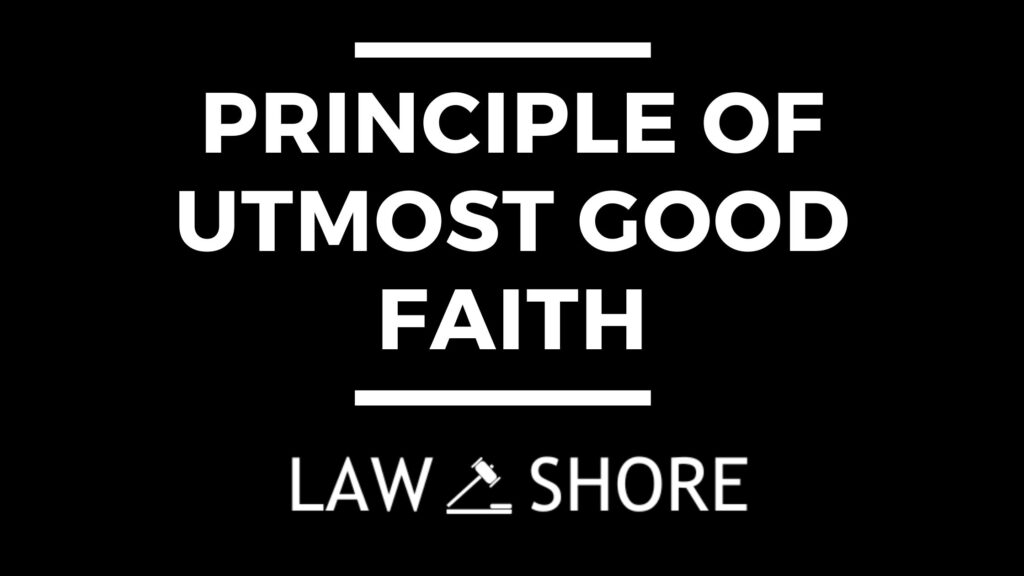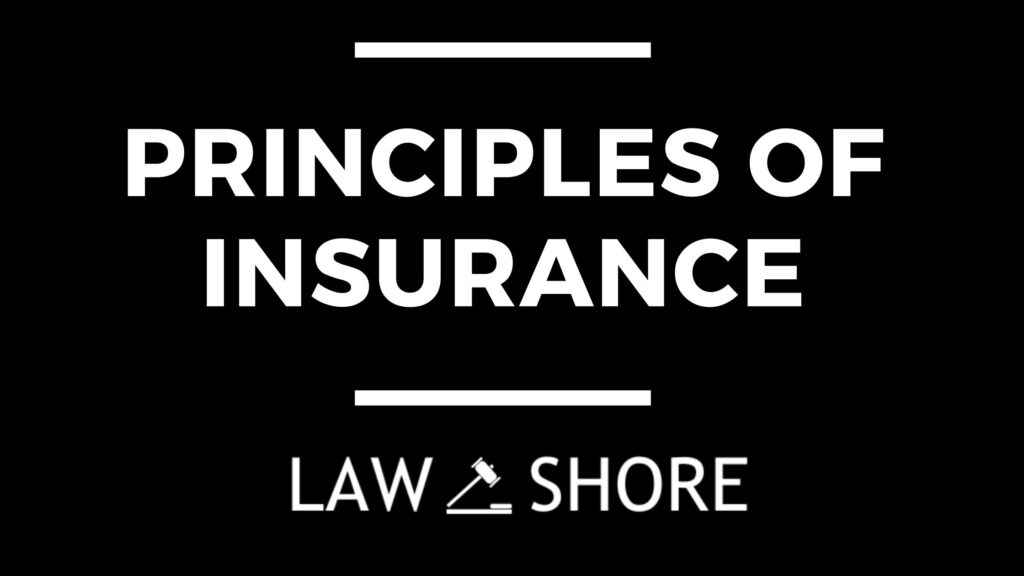Principle of Utmost Good Faith in Insurance Law
Table of Contents
ToggleThe Principle of Utmost Good Faith (also known as Uberrimae Fidei) is one of the cornerstones of insurance law. It is based on the idea that both parties to an insurance contract—namely the insurer and the insured—must disclose all material facts to each other honestly and transparently. This principle ensures that the contract is formed on the basis of trust, complete information, and fairness, which is crucial for the validity and performance of an insurance policy.
The absence of good faith can result in the avoidance of the contract and the denial of claims. In India, this principle is embedded within various legal frameworks that govern the insurance industry, including the Indian Contract Act, 1872, and the Insurance Act, 1938, as well as judicial precedents. This article examines the Principle of Utmost Good Faith, its implications in insurance contracts, and the legal consequences of its breach.
Origin and meaning of the principle of Utmost Good Faith
The principle of Utmost Good Faith refers to the expectation that both parties entering into an insurance contract will act with complete honesty and full disclosure of all material facts. It is a fundamental concept in insurance law, as insurance contracts are typically based on “contracts of adhesion”, where one party (the insurer) drafts the terms, and the other party (the insured) has limited negotiation power. The phrase Uberrimae Fidei is a Latin term that translates to “of the utmost good faith.” It reflects the idea that both parties must act in good faith and disclose all material facts that might influence the insurer’s decision to provide coverage or determine the premium.
The origin of the principle can be traced to marine insurance law, dating back to the 18th century. Historically, this principle was developed to ensure that parties to the contract—particularly in maritime insurance—would disclose all relevant facts about the ship, cargo, and voyage to avoid fraud and misrepresentation, as the insurer assumes a significant risk without fully knowing the circumstances.

Important attributes of the Principle of Utmost Good Faith
The key features of the principle of Utmost Good Faith in Insurance Law are as follows:
- Full Disclosure: Both parties, especially the insured, must disclose all material facts. The insured must reveal all information that could affect the insurer’s decision to accept the risk or set the terms of the contract.
- Non-Disclosure of Material Facts: The failure to disclose or conceal material facts can lead to the insurance contract being voidable. The insurer has the right to reject the claim or avoid the policy altogether if material facts were not disclosed in good faith.
- Impact on Contract Validity: Non-compliance with this principle can invalidate the contract. In such cases, the insurer may cancel the policy, and the insured may lose coverage, even if a loss occurs.
- Duty of Both Parties: Both the insurer and the insured are required to act in good faith. While the insurer must offer a contract that is clear and transparent, the insured must provide all relevant information truthfully.
- Material Facts: The principle hinges on the concept of material facts, which are facts that influence the insurer’s judgment regarding the terms of the contract, including risk assessment and premium setting.
Pertinent Acts and sections providing for the Principle of Utmost Good Faith
The principle of Utmost Good Faith is explicitly mentioned in the following legal provisions:
The Insurance Act, 1938
- Section 41 of the Insurance Act, 1938: It mandates that no person shall make any false statement or misrepresentation when procuring insurance. Section 41 highlights the importance of disclosing material facts at the time of entering into the insurance contract.
The Indian Contract Act, 1872
- Section 19 of the Indian Contract Act, 1872: This section deals with the concept of misrepresentation, which plays a critical role in the context of insurance contracts. It stipulates that an agreement is voidable if it is based on misrepresentation or non-disclosure of material facts.
- Section 25 of the Indian Contract Act: A contract is only valid if the consideration is lawful. The principle of utmost good faith directly affects the legal consideration of the contract since the contract must be based on honest disclosure.
The Marine Insurance Act, 1963
This Act specifically highlights the duty of utmost good faith under Section 17, which requires the insured to disclose all material facts about the subject matter of the insurance at the time of entering into a contract.
Illustrative examples of the Principle of Utmost Good Faith
Example 1: An individual applying for life insurance fails to disclose that they are undergoing treatment for a serious illness. If the insurer later discovers this, the contract can be voided, and the insurer may refuse to honour a claim on the grounds of non-disclosure of material facts.
Example 2: A shipowner applies for marine insurance but fails to inform the insurer about the vessel’s prior history of mechanical issues. If the ship sinks due to mechanical failure, the insurer can avoid the contract because the owner did not disclose the material fact that could have impacted the risk assessment.
Example 3: An individual applying for health insurance fails to disclose that they are a habitual smoker, which is a material fact influencing the risk and premium calculations. If the insurer later discovers this omission after a claim is made, the insurer may void the contract based on the breach of the principle of utmost good faith.
Example 4: A property owner seeking home insurance fails to disclose that the building has a history of structural damage, which is relevant to assessing the risk. If the building is later damaged due to its poor condition, the insurer may deny the claim for non-disclosure of a material fact.
Example 5: A business insures its goods in transit but fails to disclose that the cargo was being transported under unsafe conditions, such as improper packaging or overloading. If the goods are damaged, the insurer may deny the claim for failure to disclose these material facts about the risk involved.
Parties and Their Liability
Insured’s Liability:
- The insured has the primary duty to disclose all material facts related to the risk. This includes disclosing all information that could affect the insurer’s decision to accept the risk, calculate the premium, or set the terms of the contract. Failure to do so could lead to the insurer avoiding the contract or rejecting claims.
Insurer’s Liability:
- The insurer must act in good faith by providing the insured with clear terms, explaining the scope of coverage, and not taking advantage of any ambiguity in the contract. The insurer also has an obligation to process claims fairly and transparently.
How is the Principle of utmost good faith different from the principle of Caveat Emptor?
Caveat emptor (“Let the buyer beware”) is a principle traditionally applied in the sale of goods or property, where the buyer is responsible for ensuring the quality and condition of the goods or property. However, utmost good faith applies to contracts of insurance and is a much stricter standard.
- Caveat Emptor: In contracts governed by caveat emptor, the buyer assumes the risk and is expected to perform due diligence before entering into a contract. The buyer is responsible for verifying the quality, quantity, and condition of the goods or property.
- Utmost Good Faith: In contrast, in insurance contracts, the onus is on both the insured and the insurer to act with honesty and full disclosure. The principle of utmost good faith is designed to protect both parties, ensuring that material facts are disclosed at the outset to prevent fraud and misrepresentation.
In essence, utmost good faith shifts the burden of truth from one party to another, emphasizing mutual trust and full disclosure, whereas caveat emptor places the responsibility solely on the buyer (insured in this case) to avoid risks through caution and investigation.
Relevant Case Laws Emphasizing the Role of This Principle
Bima Kiran V. National Insurance Company Ltd. (2011)
- Key Points: The insured must disclose pre-existing health conditions when applying for health insurance. Non-disclosure or misrepresentation of material facts can lead to rejection of claims.
- Facts of the Case: In this case, the insured, Bima Kiran, applied for health insurance but failed to disclose a history of serious health conditions, specifically hypertension. The insurer discovered the non-disclosure when the insured made a claim for hospitalization due to complications arising from hypertension.
- Findings of the Court: The Court held that the failure to disclose the material fact of hypertension amounted to a violation of the principle of utmost good faith. The insurer was within its rights to reject the claim, as the non-disclosure was material to the risk assessment. The Court reiterated that both parties in an insurance contract are under an obligation to act in good faith and disclose all material facts.
Reliance General Insurance Co. Ltd. v. M/s. Ambica Construction (2011)
- Key Points: Non-disclosure of material facts related to the business operations is a breach of utmost good faith. The insurer is entitled to deny claims if material facts are withheld.
- Facts of the Case: Ambica Construction had taken out an insurance policy for its business. However, the company did not disclose certain facts about its operations, including its involvement in high-risk construction projects. When the company sought compensation for damages under the policy, the insurer discovered the non-disclosure.
- Findings of the Court: The Court ruled that the insured’s failure to disclose material facts about their business operations was a clear breach of the principle of utmost good faith. As a result, the insurer was not liable to pay the claim. The Court emphasized the importance of complete transparency and full disclosure in insurance contracts, particularly when it concerns risks that might affect the insurer’s coverage decision.
Vidyadhar S. Bhagat v. New India Assurance Co. Ltd. (2020)
- Key Points: Non-disclosure of material facts during the insurance application can lead to denial of claims. The principle of utmost good faith applies to both individual and corporate policyholders.
- Facts of the Case: Vidyadhar S. Bhagat had taken out a life insurance policy but failed to disclose his medical history of heart disease during the application process. After his death, the beneficiary filed a claim, but the insurer denied it, citing the non-disclosure of a material fact.
- Findings of the Court: The Supreme Court upheld the insurer’s decision to reject the claim. The Court emphasized that the non-disclosure of the insured’s medical history was a material fact that would have influenced the insurer’s decision to offer the policy. The Court reiterated that the duty of utmost good faith applies strictly to the insured, who must disclose all relevant facts during the formation of the insurance contract.
Bharati Knitting Co. v. National Insurance Co. (1996)
- The Supreme Court held that the insured had a duty to disclose material facts in the event of a claim, such as the occurrence of a previous loss. The insurer’s right to avoid the contract was upheld as the insured did not comply with the principle of utmost good faith.
New India Assurance Co. Ltd. v. Genus Power Infrastructure Ltd. (2011)
- The court discussed the consequences of non-disclosure of material facts, particularly in the case of insurance contracts involving corporate entities. The decision emphasized that even corporate entities must adhere to the principle of utmost good faith.
What are Material Facts?
Material facts in insurance are those facts that:
- Could influence the insurer’s decision to accept the risk, set premiums, or offer coverage.
- Are directly related to the risk being insured. For example, in life insurance, an individual’s health history, smoking habits, and occupation may be material facts.
- Could include information about past claims, prior losses, or other insurance policies held by the insured.
- Material facts are not just limited to facts that would directly affect the policy but also any facts that might affect the insurer’s decision-making process. Failure to disclose such facts is considered a breach of the principle of utmost good faith.
Legal Consequences of Breach of Principle of utmost good faith
The legal consequences of breaching the principle of utmost good faith can be severe. They include:
- Voidability of the Contract: The insurer may have the right to declare the insurance contract void from inception if the insured fails to disclose material facts.
- Denial of Claims: The insurer may refuse to honor any claims made by the insured, especially if the insured has concealed material facts during the policy’s formation.
- Forfeiture of Premium: In cases of non-disclosure, the insurer may not only avoid the contract but also refuse to return the premiums paid.
- Legal Action for Fraud: If the breach is found to be fraudulent, the insured may face legal action and possible penalties.
Conclusion
The principle of Utmost Good Faith is an essential element in the formation and enforcement of insurance contracts in India. It establishes a framework for transparency, honesty, and fair dealing, ensuring that both the insurer and the insured are protected from fraud and misrepresentation. Non-compliance with this principle can lead to the invalidation of the contract, denial of claims, and legal consequences.
The principle highlights the difference between insurance contracts and regular commercial contracts, emphasizing the need for trust and full disclosure due to the inherent risks involved. For a thriving insurance market, both parties must adhere to this principle, which safeguards the interests of all involved and fosters confidence in the insurance system.
Explore Law Shore: law notes today and take the first step toward mastering the fundamentals of law with ease.

After Completing my LLB hons, I started writing content about legal concepts and case laws while practicing. I finally started Law Shore in 2024 with an aim to help other students and lawyers.



